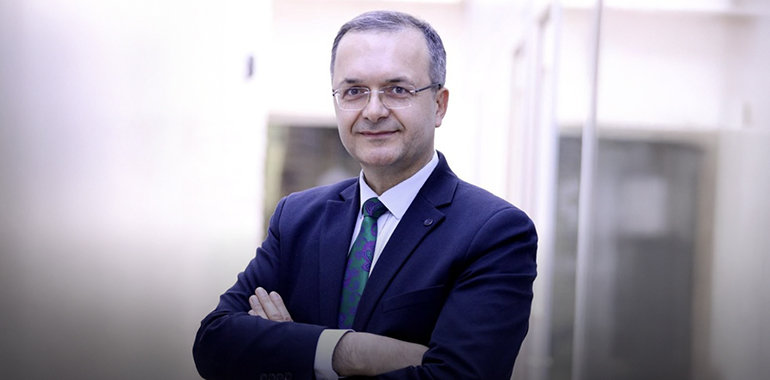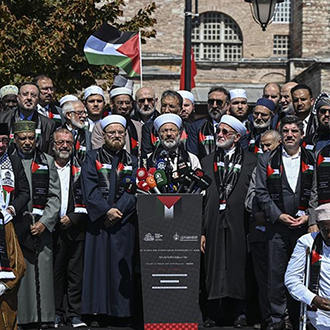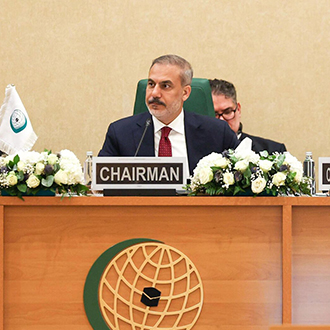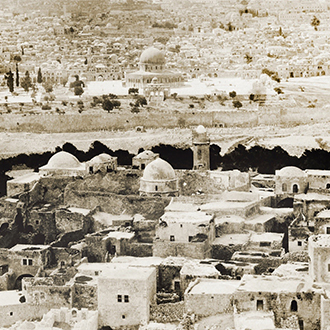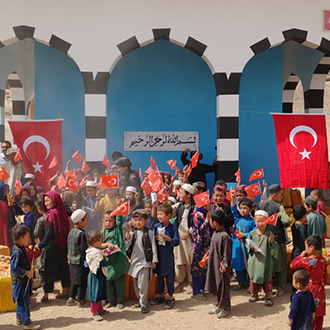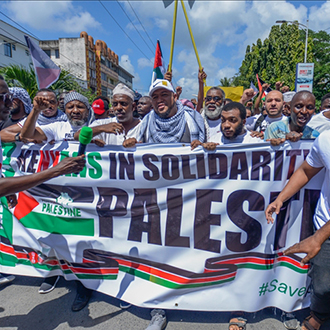Prof. Dr. Ihsan Capcioglu completed his undergraduate studies at the Faculty of Theology at Ankara University in 2000, earned his master’s degree in 2003, and received his doctorate in 2008. He became an Associate Professor in 2012 and was promoted to Professor in 2018. He is currently a faculty member in the Department of Philosophy and Religious Studies, Division of Sociology of Religion, at the Faculty of Theology, Ankara University. In October 5, 2020, he was appointed as a member of the High Board of Religious Affairs. Professor has co-authored books, published articles in international peerreviewed journals, and contributed chapters to both national and international publications. He has taken part in numerous projects conducted under the auspices of the European Union, Scientific and Technological Research Council of Türkiye, Turkish Academy of Sciences, Council of Higher Education, Turkish Cooperation and Coordination Agency, and Ministry of National Education.
Esteemed Professor, it is evident that the Qur’an and the sunnah accord a distinguished place to the family. How would you assess the value and importance that Islam places on the institution of family in light of verses from the Qur’an and hadiths?
The family, which constitutes the most fundamental building block of society, is a reality as old as human history itself, beginning with the Prophet Adam (as). The fact that the institution of family is as old as the history of the prophets reminds us of two key points. First, the first human being was also the first prophet and by extension, the first father of a family. His wife, likewise, was the first mother. In other words, the concept of the nuclear family originates with the Prophet Adam, Hawwa, and their children. Throughout history, references to the family are found in all cultures and belief systems, underscoring its universal importance. Similarly, the Qur’an strongly emphasizes the importance of the family. As stated in the Qur’an, Allah created the family so that spouses may find tranquility in one another (Rum, 30:21). Thus, the Qur’an refers to the core functions of the family. The family is an irreplaceable institution for the continuation of lineage. Without family, there is no future; without family, there is no progeny; without family, there is no society; without family, there is no culture; without family, there is no faith or value. The family is therefore a productive unit that prepares human beings for life and shapes their most essential moral and ethical foundations. We also observe strong references to family in the examples of the prophets presented in the Qur’an. The prophets are seen as fathers of families. Likewise, the Prophet Muhammad (saw), who was an exemplary family man, became our model in how he lived and upheld values such as respect, love, devotion, and loyalty toward his wife, Khadijah. In the culture of Muslim societies, the family draws nourishment from a set of foundational values, and examples of these are conveyed to us through the stories of the prophets in the Qur’an and the hadiths of the Prophet Muhammad. For instance, the Prophet (saw) mentions certain qualities to be sought in a spouse when establishing a marriage. Many of these qualities emphasize good character, encouraging the choice of a pious and morally upright partner. Indeed, this guidance underscores the strong connection between the family and its foundation in values, reminding us that we must take guidance from the life of the Prophet (saw). When speaking of the family, our primary guide is the Qur’an and the life of the Prophet Muhammad, particularly the examples he set through his conduct in family life.
In Islamic society, the family is not merely an individual unit, but also the cornerstone of the social structure. What kinds of recommendations does Islam offer for establishing strong and morally upright families?
First and foremost, in order to establish a strong family, both spouses must possess sound character. Character formation itself begins within the family, and those who are preparing to become parents acquire these values from the families in which they were raised. The values internalized within the family setting by the age of six or seven play a pivotal role in shaping a person’s character. Here, the influence of the family, specifically the distinct roles of the mother and the father, contributes significantly to a child’s character development. This is not merely a transmission of knowledge; it is, undoubtedly, also the transmission of emotion, values, and experience. If parents wish to instill a particular behavior in their children, they must first embody that behavior themselves. If we desire to raise moral individuals and upright children, which our faith indeed requires of us, then we must first integrate ethical values into family life. Through these values, the family transforms into a home. When we build a family unit with individuals of high moral character, our children, in turn, grow to seek and find such individuals. The family we establish becomes a link in an unending chain, extending into the future. The values acquired within the family are gains that no other institution can provide. The absence of a family is a profound tragedy in a person’s life. For example, the concept of “social orphanhood” refers to a lack of adequate attention and affection from parents toward their children, as well as the failure to establish strong emotional bonds. When such attachment is not formed, it creates a significant void in the child’s inner world.
Islam commands the establishment of strong bonds and just relations among family members. In this context, what is the significance of concepts such as love, respect, and a sense of responsibility between spouses, as well as affection, obedience, and compassion between parents and children?
I assess the family in four distinct stages. The first is the stage of establishing a family the initial step in forming a home. The second stage is becoming a family because not everyone who establishes a family is truly able to be a family. Once a family has truly formed, the third stage is to preserve the family. Moreover, the fourth stage is to remain within the family, which is critically important. By this, I mean the following: your children must be genuinely happy to be part of the family. However, sometimes, instead of spending time with their family, children, and young people prefer to be outside the home or, even within the house, remain isolated in another room, absorbed in virtual worlds on a screen. This suggests that the warmth of the home has not been sufficiently established. Core values such as love, compassion, and loyalty must be transformed into lived experiences among family members. Your children may be biologically connected to you, but for them to be bonded to you in terms of values, and to truly remain with you as part of a cohesive household, requires intentional effort and dedication. Parents must embody and sustain certain values within the family that will keep their children rooted in the warmth of the home. If values are not transformed into experience, individuals are unable to transmit a meaningful sense of home to the next generation or their inner consciousness. At this point, it becomes vitally important that the mother and father are aligned in terms of education, knowledge, culture, and value perspectives. In the Islamic tradition, one of the key criteria in establishing a family is that the spouses be wellmatched. But where should this compatibility lie? It should be in character, in outlook on life, and in the meaning both spouses attach to the concept of home. Both must be able to say: “We imagine such a future, such a family.” When this harmony is absent and conflict arises, the warmth of the home suffers greatly and the family is inevitably pulled toward undesirable outcomes.
Islam places the responsibility of preserving and nurturing future generations upon the family. What are the fundamental duties entrusted to Muslim families in order to fulfill this divine trust in the best possible manner?
Among the many responsibilities of parents, the most important is to raise righteous children. According to our faith, raising a righteous child means that the doors of reward remain open for the parents. When parents pass on to the Hereafter, the good deeds of their children continue to keep their record of deeds open. Therefore, raising a righteous child is a fundamental goal for all mothers and fathers. At the same time, children also bear responsibilities toward their parents. Children must observe the rights of their parents, as parental rights are consistently listed among the foremost duties in the Qur’an when obedience is mentioned. Hence, the rights of parents are of exceptional importance, and children must honor and uphold those rights with care and reverence. The family is an irreplaceable institution an essential mechanism for the continuity and sustainability of life. It must be made heartfelt, continuously supported, strengthened, and encouraged. The home must provide peace so that individuals are drawn to enter that atmosphere of tranquility with willingness. However, if establishing a family is made too difficult, people may choose to avoid it altogether. Therefore, forming a family must be facilitated and supported in every aspect. Economic, social, spiritual, and psychological support are all vital. At the same time, the legal foundation of the family must be continually reinforced. It is also necessary to keep positive examples of family life in the public eye to promote and sustain a healthy societal understanding of family.
Today, like society itself, the family is undergoing rapid change and transformation. It is evident that not all of these changes are positive, and the institution of family is facing serious challenges. What are the core principles Islam offers to protect and strengthen the structure of the family?
Problems and change have existed in every era, and they exist in our time as well. But as you rightly noted, we are now facing a transformation of unprecedented speed. Today, we describe change with expressions like “dizzying” or “unfathomable.” In such a rapidly shifting world, it becomes increasingly difficult to hold onto, identify, maintain, and preserve what is constant. Yet the truth is that change is not something to fear—it is something to which we must adapt. The key lies in correctly identifying what is changing. Even within the human body, millions of cells regenerate daily. Life is dynamic; there is a constant flow. But we need to contribute to this flow with our own values and perspectives. There is a pressing need today for family literacy in other words, an understanding of what it means to be a parent. Before building a home, prospective parents must be informed and made aware of the significance and responsibility of parenthood. Let us reflect on how we can firmly shape our children’s character, dedicate effort to this task, and make it a central priority in our lives. Parents who have a sense of family responsibility should set themselves the goal of teaching their children about their rights, responsibilities, and values. Parents often prefer to raise their children in the same manner they themselves were raised. However, the time in which they grew up and the era in which their children are being raised are vastly different. As you mentioned, in a world that is changing this rapidly, trying to educate children today with the methods and mindset of a previous generation is simply not realistic. Therefore, we must act with a sense of realism. We must move forward with the awareness that children cannot be brought up under the same conditions we experienced, and we must choose patience as our guiding principle. At this point, we must acknowledge that while there are good mothers and fathers, there is no such thing as the ideal mother or father, because the notion of “ideal” differs from person to person. Is there an ideal child? No, there isn’t. But there are good children. A good child is a moral and upright child. Sometimes, a good child may anger their parents. They may say, think, or do things their parents disapprove of, but this does not mean they are bad. It simply reflects a lack of experience in the learning process. As these missing pieces are gradually filled in, they too will become successful children. They will become successful parents, inshallah, and will be able to build a strong, qualified, and virtuous home.



